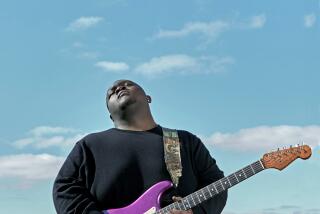A king, and yet a prince
THE tour bus where B.B. King is sitting has parked right outside the artists’ entrance at Gibson Amphitheatre in Universal City so the walk to the stage will be short and painless.
The venerated guitarist, singer and songwriter is balancing his lifelong yearning to get onstage against offstage life with diabetes. The illness has given him a latter-day second career as a spokesman for a glucose monitoring device, and he mentions those ads for comic relief once he’s in front of an audience again.
For the record:
12:00 a.m. Oct. 19, 2005 For The Record
Los Angeles Times Wednesday October 19, 2005 Home Edition Main News Part A Page 2 National Desk 1 inches; 44 words Type of Material: Correction
B.B. King -- A profile of B.B. King in the Oct. 9 Sunday Calendar section said the blues musician had been married and divorced twice, with no children. King had no children with either of his wives but fathered 15 children with other women.
For The Record
Los Angeles Times Sunday October 23, 2005 Home Edition Sunday Calendar Part E Page 2 Calendar Desk 1 inches; 38 words Type of Material: Correction
B.B. King’s children -- An Oct. 9 article on guitarist B.B. King said that he has been married and divorced twice, with no children from either marriage. However, King acknowledges having 15 children (five adopted) with other women.
But the truth of his condition is that, at age 80, walking and even standing now require serious effort, the reason he spends as much time as possible off his feet.
Stretched across the bus’ comfortably upholstered bench, in the same black silk shirt, black slacks and gleaming black patent leather shoes he’ll wear onstage, the one-time Mississippi sharecropper exudes a regal presence befitting the man always introduced as “the king of the blues,” a musical monarch whose bus is his castle.
Yet this is no king in exile. The road is where B.B. King wants -- lives -- to be: either relaxing before a show with such techno toys as MP3 and DVD players and satellite radio, or fiddling with them on the journey to the next gig. The 13-time Grammy winner technically lives in Las Vegas, but rarely spends a week there without a next gig looming.
Last year, King Carl XVI Gustaf of Sweden presented King with the Royal Swedish Academy of Music’s annual Polar Music Prize, but despite such late-in-life accolades, there remains one reality for him. The music he’s played to audiences in 90 countries more than 300 nights a year for upward of six decades still doesn’t get the recognition he thinks it should.
His constant touring, therefore, is as much a product of necessity as desire.
“I’m not doing as much as I once was,” he says, a sobering comment given not only his touring but the fact that he’s just released a new album, “80,” of duets with a dozen rock and pop stars; has a new book, “The B.B. King Treasures”; and is making a series of national TV appearances. Oh, and he’s at work on a blues museum in Indianola, Miss., where he grew up.
“People thought I was truly a workaholic. But I never got the exposure in my kind of music that other types of music that are exposed daily in the media [received],” he says with more than a trace of hurt in his voice.
“I never had that. I’ve had one record that was played like other records. It was called ‘The Thrill Is Gone,’ the only one I ever had that was played on radio stations like other types of music, unless I was playing with somebody else.”
King is an imposing presence in his head-to-toe black outfit, even though this is one of the rare times he doesn’t show up in a three-piece suit or a tux -- an image decision he made early on.
“I had a cousin, a blues singer called Bukka White,” he says. “He said, ‘If you’re a blues singer, you’re already put down by just being a blues singer. So if you’re going to be a blues singer, always dress as if you’re going to the bank to try to borrow money.’
“What he meant was don’t look as if you just slept under the bridge last night.”
Motives behind the music
BEFORE he was a bluesman, he was a country boy named Riley B. King on a Mississippi plantation. He earned 35 cents per 100 pounds of cotton he picked, and he could pull close to 500 pounds a day. Later, he learned to drive a tractor and upped his pay to $22.50 a week. Tractor drivers got a lot more attention from girls than cotton pickers did, but he quickly learned that musicians got even more. That’s not the only reason he chose music, but it’s not inconsequential either.
“I think woman is God’s greatest creation,” says King, who has been married and divorced twice, with no children. “I think we’re No. 2, but she’s No. 1. Not that I want to sleep with every woman I meet, but I admire them all.”
That admiration colors his assessment of the vernacular of today’s music, especially rap. “I don’t kick rap,” he says, “as long as they use clean lyrics. But when they start talking about what they could do to women, then I get mad.”
Over his long career, King has made excursions into rock, R&B;, even disco, but he’s always stayed rooted in the blues, and been a bit disappointed that so few young black musicians seem interested in the sound he loves. (Recently he’s toured with Kenny Wayne Shepherd and Joe Bonamassa, two next-generation white blues players.)
There are Beatles detractors, U2 skeptics. But you’d be hard-pressed to find anyone with a negative word to say about B.B. King or his music. “B.B. King taps into something universal,” says Eric Clapton. “He can’t be confined to any one genre. That’s why I’ve called him a ‘global musician.’ ”
Nor is there much debate that he’s among the kindest souls in the music world.
King owes a good part of that to his mother, Nora Ella King, and her words to him when he was 9 and she was dying. As blues historian Charles Sawyer writes in his introduction to “The B.B. King Treasures”: “She reminded him that he was a good boy, that he should try to do good, and that he should be kind to others, because the kindness would always come back to him.”
His parents’ marriage ended when Riley was 4, but he found four key male role models who helped shape his outlook on people and the world: his grade-school teacher, Luther Henson; Johnson Barrett, the owner of a plantation where he once worked; Flake Cartledge, the patriarch of a white family that employed him as a houseboy; and Bert Ferguson, one of the owners of WDIA, the Memphis, Tenn., radio station where he made his name as “Blues Boy,” later simply B.B.
Seventy years later, King thinks their examples served him well as he grew up in a segregated South. “The bad times I had in my early years ... ,” he says, his voice trailing off. “People have been so good to me the last 40 or 50 years that I forgot ‘em. I really forgot ‘em. For me to think about them, somebody’s gotta talk about it -- the segregated era and the many things that happened.
“I finally learned that drinking out of a white fountain, the water tastes just as good out of the black one,” he says. “I didn’t notice the difference.”
The new “Treasures” book is a coffee-table volume that offers images of artifacts from throughout King’s life.
There’s a 1940 invoice from Edwayne Henderson’s plantation for his debts and credits as a 14-year-old sharecropper, WDIA’s 1951 Christmas card with a cutout of his face that lists him as “Bee Bee King,” as well as the poster for the 1968 show at the Fillmore in San Francisco that put him for the first time before a large audience that was predominately young -- and white.
“He knew immediately what this acceptance by white audiences was going to mean to him,” writes Jerry Pompili, a longtime employee of that show’s promoter, Bill Graham, in “Treasures.” “All he had needed was the opportunity, and now a whole new world had opened up for him.”
The pump had been primed in the ‘60s, largely by young, white, British musicians such as the Rolling Stones and John Mayall, who loved American blues and played it extensively, routinely paying homage to the black players who created it.
“When you mention the Rolling Stones, I get on my knees,” King says. “Any of them, I get on my knees and say, ‘Thank you, thank you, thank you.’ Because before them, we didn’t get the [recognition] that we do now.”
He’s hoping to further stoke that recognition with the $10-million B.B. King Blues Museum on 2.3 acres in Indianola, Miss., designed not as a shrine to him, but to the music that has sustained him far longer than even he expected.
In his final conversation with his friend Ray Charles, King recalled the soul great telling him, “You know, B., if we had known we’d live this long, we’d have took better care of ourselves.”
Still going strong
IN concert nowadays, King’s age is reflected in his thinning and increasingly snowy hair, and the chair on which he sits during most of his performances.
He’s still impishly animated, though, playing his famed Gibson electric guitar “Lucille” -- he chose the name after narrowly escaping a 1949 nightclub fire started by two men fighting over a woman called Lucille -- with the energy and stinging intensity that’s long characterized his music. His vocals remain impassioned, his body contorting with every painful admission, convulsing with the happy ones.
“I try my best to make that story as an actor or an actress would tell the story.... Every night I go onstage, I do my best. Every night,” he says. “But a lot of times, my best is not as good as I’d like it to be. And that’s the truth. And those are the nights I wished I could have done better.”
Discussing “80,” his new star-laden duets album, King talks of “the young people” who collaborated with him. He’s referring to youngsters including Clapton and Van Morrison (both 60), Elton John (58), Glenn Frey and Mark Knopfler (both 56) and relative toddler John Mayer (28).
“I’m so happy that everybody that was asked ... said yes. And some others who couldn’t do it at the time said they would when they could. I thought, ‘Gosh’ ... and I thought about something I read about Henry Ford. They were talking about people being rich and blessed. And [Ford] said that if he went broke tomorrow, but could borrow a dollar from each one of his employees, he still would be a millionaire.
“And I thought ... ‘If I could get 50 cents from each one of my friends around the world, I could become a millionaire too,’ ” he says. “I believe I have that many friends around the world.”
*
B.B. King
Where: B.B. King’s Blues Club, 1000 Universal Center Drive, Universal City
When: Nov. 8-9, 9 p.m.
Price: $75 to $250. Selectively priced tickets include buffet and drinks
Contact: (818) 622-5464
Also
Where: Vault 350, 350 Pine Ave., Long Beach
When: Nov. 12, 9 p.m.
Price: $75
Contact: (562) 590-5566
More to Read
The biggest entertainment stories
Get our big stories about Hollywood, film, television, music, arts, culture and more right in your inbox as soon as they publish.
You may occasionally receive promotional content from the Los Angeles Times.










